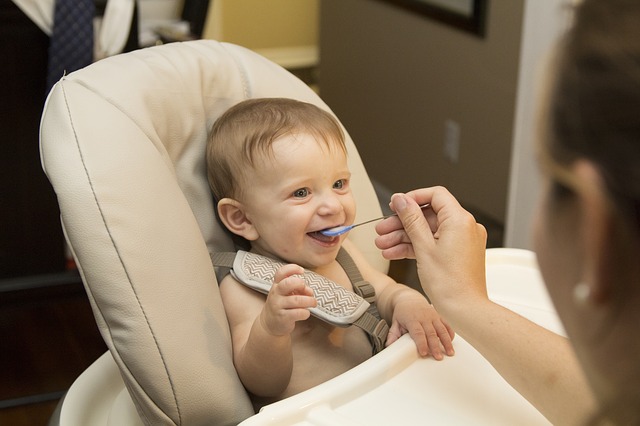Having a child is one of life’s most precious events and naturally many parents seek advice on how to best take care of them. Parents not only want to sustain their child but make sure that they get the best start in life.
Babies grow incredibly fast in their first year of life and need plenty our nourishment along the way. The growth of a child isn’t always a predictable climb and their appetite will have several hills and valleys.
Babies will often show different levels of interest in food and this is completely normal. Let’s take a look at some of best general tips when it comes to feeding your baby.

Begin feeding them solids at around 6 months
Most babies will require breast milk until their about a year old but this can vary depending on them and their mother. Baby formula is an important supplement until the end of the first year.
At around the 6 month mark a baby will have low stores of iron and will require additional foods along with their mother’s milk. Ideally, the infant should be showing signs of interest in solid foods around this time.
If you are unsure if your baby is ready for solid food, look for the following signs that show they are:
- The baby is able to keep its own head upright
- Shows interest when food is present by leaning or reaching towards it
- Opens their mouth when food is offered to them
Don’t start solids too early
If a baby appears to be excessively hungry then continue feeding them breast milk or formula until they are ready for solids. Some parents believe that introducing solids early will help their baby settle, sleep or have better growth but this is untrue.
If solids begin to replace milk and formula too early the baby’s growth could be negatively impacted. If babies are too young to digest solid foods they can develop loose bowel problems like diarrhoea.
Signs that the baby isn’t interested
Even when a baby begins eating solids they will not always accept them. The baby may close their mouths tightly at the sight of food or turn their heads away from spoons.
Many babies will spit out solid foods when they are first offered but this is normal. Simply continue to feed them when they’re ready and they will begin to easily digest the food.
Developing eating skills

While giving babies solid foods is a big step in their development, it’s an even bigger step when they start to chew foods and feed themselves. Around 8 to 9 months of age a baby should be offered new foods with tougher textures that will encourage them to begin chewing.
Giving a baby their own spoon is a great way to encourage them to self-feed even if you are still putting the food in your mouths themselves. They will begin to correlate the spoon with getting food and learn to use it faster.





